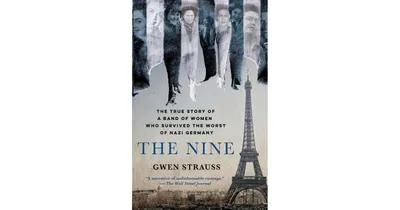Home
All She Lost: the Explosion Lebanon, Collapse of a Nation and Women who Survive - Between Civil War, Israel Hezbollah
Loading Inventory...
Barnes and Noble
All She Lost: the Explosion Lebanon, Collapse of a Nation and Women who Survive - Between Civil War, Israel Hezbollah
Current price: $28.00


Barnes and Noble
All She Lost: the Explosion Lebanon, Collapse of a Nation and Women who Survive - Between Civil War, Israel Hezbollah
Current price: $28.00
Loading Inventory...
Size: Hardcover
*Product Information may vary - to confirm product availability, pricing, and additional information please contact Barnes and Noble
Lebanese journalist Dalal Mawad investigates the modern history of Lebanon f
rom the port explosion and civil war to the role of Hezbollah and Israel
- and weaves an extraordinary story of survival, corruption and impunity through the stories of the women who survive
'Poignant and compelling' - Lindsey Hilsum
'Essential and urgent' - Kim Ghattas
Lebanon and the Middle East is in crisis. For this extraordinary book, journalist Dalal Mawad conducted a series of searing interviews with women in Lebanon - weaving an extraordinary story of survival, corruption and impunity.
She begins with a huge explosion in the heart of Beirut that killed hundreds of people – it was the apocalypse of a sequence of events that have led to Lebanon's unprecedented collapse. Award-winning journalist Dalal Mawad was in Lebanon when the blast happened, and was one of the first journalists to report on the mysterious and devastating explosion.
During her reporting, she discovered something else – that it is the women who stay behind, and it is through their stories that the history of the Middle East must be re-constructed. She set out to record the stories of those she met, the women long discriminated against, and those whose stories are untold.
She spoke to mothers who lost their children, spouses who lost their partners, refugee women who have fled from the war in Syria – and who now find themselves in another failing state. We hear from the Lebanese grandmother, bankrupted by the small nation's collapse, who remembers Beirut's glory days of the 1960s – when the likes of Brigitte Bardot and Miles Davis came to Beirut. And then the women like Dalal herself, who have left their home behind.
The women in this book all experienced the explosion and suffered unimaginable loss and tragedy, but it is not just this one event that brings them together. Their personal stories converged to tell the story of a nation whose glory days are long gone, now riven by protracted violence, lurching from crisis to crisis, and fighting to survive. It tells not only of what these women have lost, but also what Lebanon has lost, and a part of the Middle East that is no more.
rom the port explosion and civil war to the role of Hezbollah and Israel
- and weaves an extraordinary story of survival, corruption and impunity through the stories of the women who survive
'Poignant and compelling' - Lindsey Hilsum
'Essential and urgent' - Kim Ghattas
Lebanon and the Middle East is in crisis. For this extraordinary book, journalist Dalal Mawad conducted a series of searing interviews with women in Lebanon - weaving an extraordinary story of survival, corruption and impunity.
She begins with a huge explosion in the heart of Beirut that killed hundreds of people – it was the apocalypse of a sequence of events that have led to Lebanon's unprecedented collapse. Award-winning journalist Dalal Mawad was in Lebanon when the blast happened, and was one of the first journalists to report on the mysterious and devastating explosion.
During her reporting, she discovered something else – that it is the women who stay behind, and it is through their stories that the history of the Middle East must be re-constructed. She set out to record the stories of those she met, the women long discriminated against, and those whose stories are untold.
She spoke to mothers who lost their children, spouses who lost their partners, refugee women who have fled from the war in Syria – and who now find themselves in another failing state. We hear from the Lebanese grandmother, bankrupted by the small nation's collapse, who remembers Beirut's glory days of the 1960s – when the likes of Brigitte Bardot and Miles Davis came to Beirut. And then the women like Dalal herself, who have left their home behind.
The women in this book all experienced the explosion and suffered unimaginable loss and tragedy, but it is not just this one event that brings them together. Their personal stories converged to tell the story of a nation whose glory days are long gone, now riven by protracted violence, lurching from crisis to crisis, and fighting to survive. It tells not only of what these women have lost, but also what Lebanon has lost, and a part of the Middle East that is no more.













